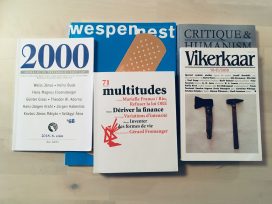Abstracts Multitudes 23 (2005)
Patrick Simon
L’ordre discriminatoire dévoilé : statistiques, reconnaissance et transformation sociale
The living conditions of migrants, the discrimination to which they are exposed, do not appear on our colour-blind statistical radars. Categories based on ethnicity and race apparently contradict the goals of the French model, egalitarian and universalist. But accounting for them can help immensely in the struggle against inequalities, and constitutes a precondition to real universality.
Jean-Marc Salmon
Questions de cendres
After the fires which destroyed three Parisian buildings housing immigrant families last summer, this article reconsiders the disastrous effects of institutional racism, made worse by the housing crisis in the Paris region.
Teun A. Van Dijk
Le Racisme dans le discours des élites
European elites are racist, and have been racist for a long time. Their racism is not limited to “words” and “ideas”, but constitutes a pervasive and influential social practice, which generates, towards the minorities, concrete forms of ethnic inequality and subordination in everyday life.
Giuseppe Cocco & Antonio Negri
Les Modulations chromatiques du biopouvoir au Brésil
In Brazil, a real mixing of populations is prevented by the proclamation of a “grey people”, artificially invented and imposed by force in order to stabilize the nation-state. Black and indigenous movements today have to reclaim “race” in their struggle for real equality in order to impose policies of affirmative action in the university and elsewhere.
Raúl Sanchez
L’Europe, Ceuta, Melilla : la perspective des camps
Confederate Europe pushes its borders further and further south, and confides their management (repression, imprisonment, deportation) to the neighbouring countries, as we have recently seen in Morocco, at the Spanish colonial enclaves of Ceuta and Melilla. The migrants are treated like a natural catastrophe, political leaders rival each other in their racism, and the internal border between nationals and migrants in the labour market remains secure (the link between residency papers and work permits nourishing a de facto contemporary slave economy).
Matso
Mayotte fabrique un peu d’Europe dans le canal du Mozambique et prépare l’avenir
This article presents the events of October 2005 in Mayotte : it appears that the discourse on illegal migrants, which is instrumentalized in order to justify the implementation of policies against immigration to Mayotte, is not at all the discourse of the migrants themselves, which remains inaudible. The violence of the past weeks will probably be followed by more to come.
Maurizio Lazzarato
Multiplicité, totalité et politique
Tomorrow’s politics will be a politics of multiplicity. Contemporary Marxism, in its political and trade unionist manifestations, appears as a major obstacle, given its inability to escape from totalizing categories (class, work, capital) and to reflect upon the political need for innovation (obsessed as it is by the conservation of acquired rights). Maurizio Lazzarato attempts to show that this double inability originates in an ontological view of relations, present in Marx himself. This is a view which needs to be reconsidered in light of the philosophy of multiplicity developed during the same period. William James’ pragmatism, for instance, allows us to understand how deeply Marx’s ontology of relation is indebted to the idealist philosophy of the nineteenth century, thus revealing the ontological limits of Marxist politics.
Isabelle Stengers
Pragmatiques et forces sociales
This paper proposes a triple hypothesis. First, that the construction of a political position today demands that the reference to progress lose its power to “put into perspective”. Second, that the answer to this demand implies taking a full measure of the extent and manner in which this reference offers arms and power to our “habits of thought”. Third, that producing such a measure be inseparable from a process of creation and experimentation. Indeed, the canonical formula of progress (” yesterday we still believed that today we know that “) awaits those who would feel that critical debunking is sufficient. The proposition to address capitalism as “sorcery”, a decision that cannot be separated from a pragmatism of resistance and struggle, tries and materializes this proposition. Some consequences of this proposition are envisaged in this article.
Philippe Pignarre
Avoir besoin que les gens pensent
New issues have invaded the political landscape over the past years (seeds, medical drugs, etc), while the traditional issues of the labour movement (work, income, etc) seem to be increasingly excluded, abandoned to the discourse of experts. With the altermondialist movement and the NO campaign to the French referendum on the European Constitution, traditional political issues have made a comeback, but “the political” itself has experienced a deep transformation in the meantime. Against experts and their didacticism, politics now consists in experimenting with collective knowledge.
Brian Massumi
Peur, dit le spectre
The article examines the politicization of fear following the 11 September 2001 attacks on the World Trade Towers. It analyzes the role of mass media imagery in the widespread production of fear, focusing on the colour-coded “Terror Alert System” put in place by the Bush Administration. It is argued that the re-centring of governmental action on the pre-emptive response to threat has introduced a new time structure into politics, which effectively renders futurity present. Through signs of fear conveyed in mass media imagery, this present futurity strikes the body at the level of affect, triggering the unfolding of a process bifurcating onto a number of self-differentiating but interconnected levels of experience. That process is construed in the essay as a “collective individuation” in Gilbert Simondon’s sense. A new vocabulary for the understanding of affective unfolding is proposed involving a four-fold distinction between “vitality affect”, “pure affect”, “emotion”, and “affective tone” (drawing on elements of the theories of C.S. Peirce, William James, Daniel Stern, Gilles Deleuze, and Alfred North Whitehead).
Sandra Laugier
L’Importance de l’importance. Expérience, pragmatisme, transcendantalisme
The article returns, in order to reflect upon experimentation, to the transcendentalism of R.W. Emerson and H.D. Thoreau. The better-known pragmatist tradition has absorbed, or, as Stanley Cavell suggests, has repressed such authors. However, the central concepts proposed by Emerson – Self-Reliance, the common, the low – not only announce pragmatism, but suggest a use of practice and a redefinition of experimentation which, in their radicality, go beyond pragmatist inquiry. Self-confidence and ordinary life are instruments to reflect upon radical democracy and to reformat the idea of experimentation on the basis of concepts like confidence, importance, subjective constitution, and experimentation as an adventure of the self.
Nathalie Trussart
Publics et expérimentations
Through the public debates which are unfolding about Genetically Modified Organisms in Europe, new issues have taken shape. This article attempts to understand the possibility of such novelties in light of the political positions taken by the pragmatist philosopher John Dewey. In order to bring about the necessity of an active public, taking an active part in the definition and realization of political ends, he makes two radical proposals: a perspective of the emergence of the State, and political experimentation as the method needed by this perspective. The possibility of the emergence of new forms of the State, of new public issues, is the goal of political experimentation. And the formation of a public – a public taking active part in the elaboration of the knowledge needed to decide on issues which are always specific – is the causal event which has to emerge in and through such experimentation.
Stany Grelet & Aude Lalande
Drogues : ce qu’expérimenter veut dire
In French, the word ” expérience ” has two different meanings, which often merge into each other: whether one hears it as “to experience” or as “to experiment”, one will take it towards lay knowledge and techniques of struggle, or towards scientific protocols and techniques of governance. This article rides on this ambiguity, putting the two sides of this notion to the service, and to the test, of an analysis of practices and policies dealing with the issue of drugs. On this specific question, the two meanings of political “expérience” are both maximally divergent and intimately tied to each other.
Giuseppina Mecchia
Sujets en cours : micropolitiques de l’enseignement universitaire aux Etats-Unis
In societies founded on communication, it is increasingly important to think about the formation of subjectivities and of their political function. In this context, a reflection concerning a course given on these themes at the University of Pittsburgh in the spring of 2004 tries to identify strategies of positive engagement in the contemporary social and political milieu. The presence of writers such as Antonio Negri and Jacques Rancière in a class syllabus will be considered as a contribution to the autonomous and egalitarian formation of the political subject during his/her passage through the American academic system.
Giovanna Zapperi
Trouble dans la masculinité. À propos de Boyzone de Clarisse Hahn
This article reflects upon the status of male bodies in Clarisse Hahn’s Boyzone. Her work utilizes as its material the stereotypes which determine gender categories, and it analyzes the way in which such categories can be imposed, reused, or escaped from. If the observation of the male body is its main topic, the gaze itself is put into question: the artist sets the spectator in the uncomfortable position of having to question his/her own way of looking at bodies. By inverting the classical structure of voyeurism, Clarisse Hahn stages a masculinity which appears exposed, eroticized, troubled.
Alexandre & Daniel Costanzo
La Distance désaccordée
Through his photographic work, Bruno Serralongue carries a certain discomfort in representation through a reappropriation of “information”, of the conditions of production and publication of images. This discomfort opens the stage to a displacement that goes against the grain of the logic that structures common sensitivity, thus asserting other forms of relation. Identifying this discomfort, this displacement, and this relation leads to re-thinking the tension between art and politics.
Published 16 January 2006
Original in French
Contributed by Multitudes © Multitudes Eurozine
PDF/PRINTNewsletter
Subscribe to know what’s worth thinking about.



